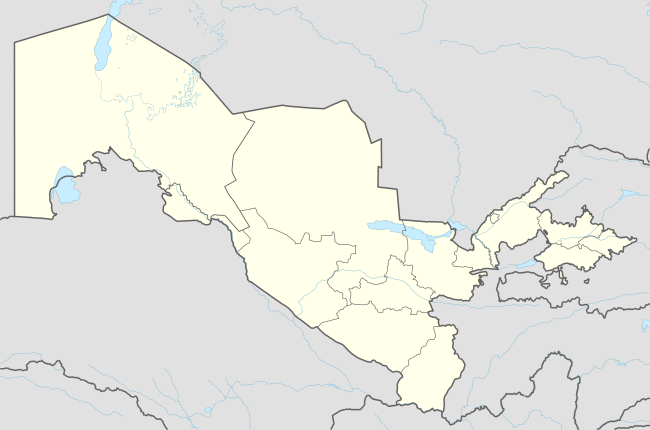G‘ijduvon
| Gʻijduvon | |
|---|---|
|
Ulugh Beg madrasa | |
 Gʻijduvon Location in Uzbekistan | |
| Coordinates: 40°06′N 64°40′E / 40.100°N 64.667°ECoordinates: 40°06′N 64°40′E / 40.100°N 64.667°E | |
| Country |
|
| Region | Bukhara Region |
| District | G'ijduvon District |
| Population (2003) | |
| • Total | 38 600 |
G‘ijduvon (Uzbek: Gʻijduvon, Ғиждувон; Tajik: Гиждувон; Russian: Гиждуван) is a town in the Bukhara Region of Uzbekistan and the capital of G‘ijduvon District (tuman). Its population in 1970 was 16,000.
History
One of the three madrasahs built by Ulugh Beg is in G'ijduvon (the others are in Samarkand and Bukhara). The tomb and memorial of a prominent Central Asian philosopher Abduholik Gijduvoni is also located in G'ijduvon.
Historically, G'ijduvon is used to be an educational, religious, and cultural center for G'ijduvon and the region. However, starting from 1930's the population became increasingly secular and today the religion plays a very minor role in everyday life. Modern G'ijduvon is a commercial center for not only G'ijduvon district but also for neighboring areas.
There remains in G'ijduvon a madrasa with a lofty portal built by Ulugh Beg [1]
Cuisine
G'ijduvon is famous for its local cuisine and is considered to have the best fish frying and shashlik making techniques. Shashlik is beef or lamb marinated overnight and grilled on skewers. Many other restaurants in the country, including those in the capital Tashkent copy G'ijduvon's fish frying technique. The main difference is that in G'ijduvon cooks de-bone the fish before frying while in the rest of the country fish is not de-boned.
The town is also known for its traditional Uzbek treats like halva, candies, etc. Many agree that G'ijduvon was able to cultivate more refined cuisine compared to other parts of the country because it is one of the earliest populated areas in Central Asia. Bukhara, a fifth largest city in Uzbekistan, is about 40km away that city has been populated for at least five millennium and G'ijduvon is thought to fall in the same areas as long as its age is concerned.
Culture
The languages spoken in G'ijduvon are Uzbek, Tajik and Russian. Although the majority of population identifies themselves ethnically as Uzbeks, some oldest families in the city speak Tajik at home.
The city used to have a large Jewish minority who moved to Israel and the United States after the fall of the Soviet Union when economic conditions were difficult.
The foremost sport is soccer.
The city has high schools, a few vocational schools, medical college, hospitals. G'ijduvon has no higher educational establishments so in order to attend universities the residents travel to Buhkara, Samarkand, Tashkent or other bigger cities.
Industry
G'ijduvon is in the irrigated cotton growing area of Uzbekistan between the Zeravshan River valley and the Shimolii canal. The town has a cotton processing plant which prepares cotton grown by the farmers in the region for export. Cotton's importance in Uzbekistan's economy has been continuously dropping since the independence in 1991 which is why G'ijduvon and the region has been diversifying its economy and its agriculture is moving away from cotton and branching into vegetable and fruit farming. Some sectors of the economy like transportation are also on the rise. M34 highway connects G'ijduvon to other parts of the country including Bukhara, Samarkand and Tashkent.
Historically, the town was famous for its industrious merchants who traveled to other bigger commercial centers and brought various goods to the local market. They seem to uphold that reputation to this day. Local businessmen travel to China, Russia, the Baltic states, Turkey and Iran to buy goods wholesale and bring those goods to G'ijduvon. These days shoppers from outlying areas come to G'ijduvon for any type of shopping including groceries, various type of supplies, home appliances and electronics, car parts, clothing, etc. G'ijduvon has a whole-sale market where merchants from surrounding areas buy their supplies and sell in their shops in rural areas. The town operates a live stock market too where farmers can buy and sell their live stock.
G'ijduvon craftsmen play important role in the local economy and their work is a major attraction for tourists. The town has a distinct style of the pottery which is defined by applying a unique turquoise-bluish color to the pottery. Some notables including Prince Charles, the Prince of Wales and Hillary Clinton have been to G'ijduvon to see the work of local craftsmen.
References
| Wikimedia Commons has media related to Gijduvan. |